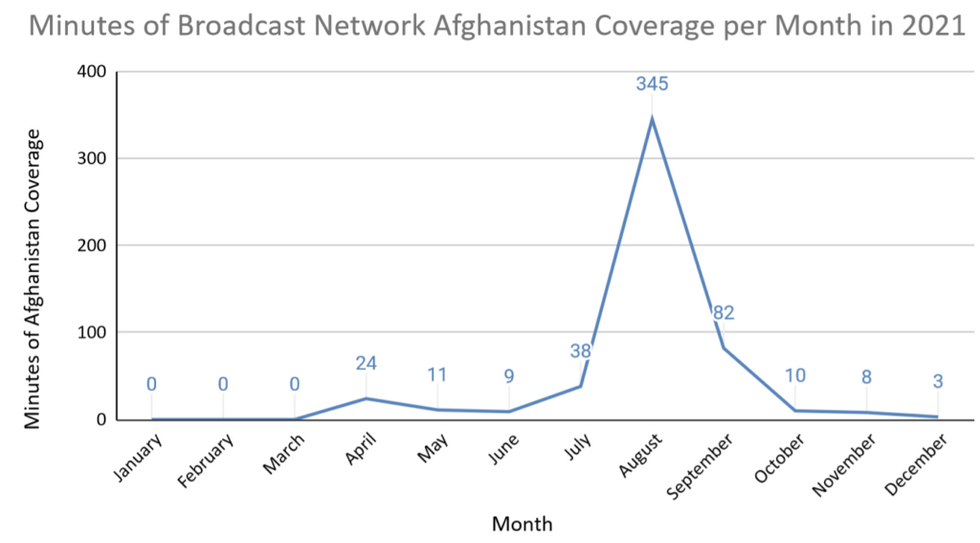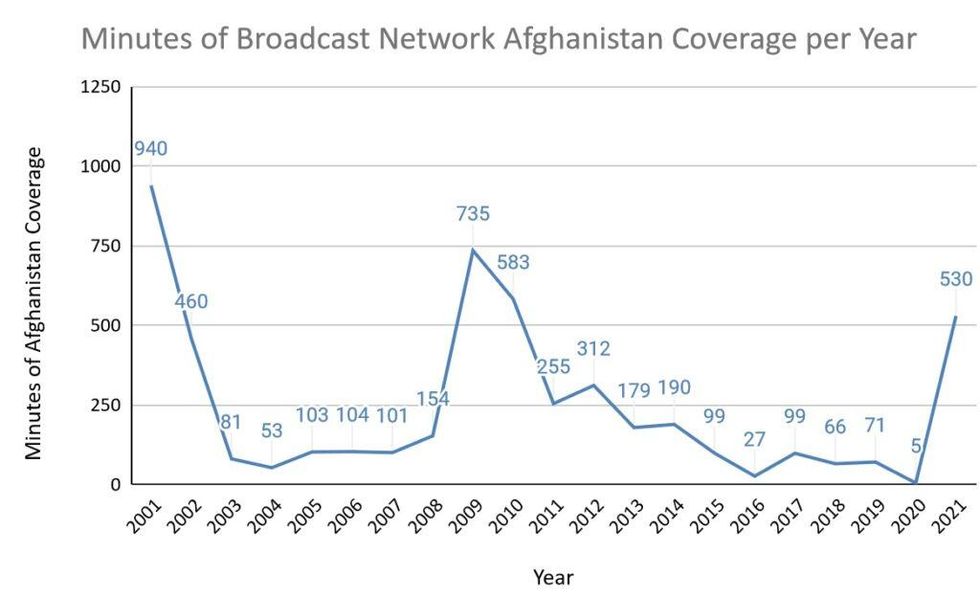Despite unprecedented levels of hunger and starvation for which U.S. sanctions bear important responsibility, Afghanistan has once again virtually disappeared from the most important single source of world news for most Americans.
Since September, which marked the end of U.S. efforts to evacuate its citizens and its foreign and Afghan allies, the evening news programs of the three dominant U.S. television networks--ABC, NBC, and CBS--have collectively devoted a grand total of 21 minutes--spread over ten story segments--to Afghanistan.
No more U.S. soldiers and marines on the ground, no more coverage on the evening news, and Afghanistan, despite Washington's enormous impact on the country, both through its military intervention and now through its sanctions, fades quickly into distant memory.
That marks a stunning plunge in evening news attention from a total of 427 minutes devoted to Afghanistan in the two previous months, about 75 percent of which were broadcast in August during the Taliban's takeover of the country and the chaotic withdrawal of U.S. and allied personnel. Just one three-minute segment has aired since December 1.
"For the American networks this year, what was newsworthy was the fall of Kabul and the pullout of U.S. troops, not the fate of the Afghan people in the aftermath," noted Andrew Tyndall, editor of the authoritative Tyndall Report, which has monitored the three networks' nightly news broadcasts each weekday since 1988.
Moreover, 15 of those 21 minutes devoted to Afghanistan between October 1 to December 25 had nothing to do with its increasingly desperate humanitarian crisis that threatens nearly 23 million people--or more than half the country's population--with "extreme levels of hunger," and as many as one million children with death due to severe acute malnutrition this winter.
Indeed, four of the ten segments were hopeful, "feel-good" stories focused almost entirely on U.S.-based efforts to help former Afghan allies who are adapting to their new lives in the United States or are still trying to flee the country. A fifth story dealt with an initiative to help Afghan girls continue their education in computer coding remotely, and a sixth was a heart-warming segment about U.S. Army medics who served in Afghanistan in 2011.
Only two of the ten news segments addressed the unfolding humanitarian disaster, which was described by the Trump-appointed director of the UN's World Food Program, former South Carolina Gov. David Beasley, as "hell on earth" earlier this month.
While the major cable news networks often receive more media attention, the three network evening news shows collectively remain the single most important source of international news in the United States.
On weekday evenings, an average of about 20 million U.S. viewers tune in to national news programs on CBS, ABC, or NBC. That's roughly four times the number of people who rely on the major cable stations--Fox News, MSNBC, and CNN--for their news during prime time. About two million more people watch the network news via the internet, according to Tyndall.
What appears on the national networks often exerts a major influence on the news agenda at other U.S. media organizations. "Because network news shows are the most mainstream of the mainstream media," Tyndall told Responsible Statecraft, "they can be used as a proxy for the news judgment of mainstream media more generally."
As I noted in an article published in August, a major reason why Americans were so shocked by the dramatic collapse of the U.S.-supported regime in Kabul was the fact that the three weekday evening news programs devoted a combined total of only five minutes to coverage of Afghanistan during all of 2020. More recently tabulated statistics compiled by the Tyndall Report show that Afghanistan was entirely absent from the network evening news in January through March of 2021 and claimed a total of only 82 minutes between April and the end of July before hitting 345 minutes in August when the Taliban swept across the country and entered Kabul. In September, by which time the Taliban had taken full control and virtually all Americans had left Afghanistan, the combined network total fell sharply to 82 minutes only to fall even further, to ten minutes in October.
 Courtesy of the Tyndall Report
Courtesy of the Tyndall ReportThe two three-minute segments that addressed the growing humanitarian and hunger crisis aired on NBC Nightly News and ABC Evening News on November 17 and December 15, respectively.
To be fair, the CBS news organization as a whole devoted much more attention to the disastrous situation in Afghanistan than indicated by its evening news program. In fact, it alerted its "CBS Mornings" audience to the brewing crisis back on October 20 when it cited UN warnings that "95 percent of people in Afghanistan are going hungry" and featured an on-site account by correspondent Imtiaz Tyab.
But the morning network news shows generally attract only about a third of the audiences of their evening counterparts.
Much more commendable was CBS's coverage of the humanitarian crisis in a nearly 15-minute segment featured on the December 12 edition of "60 Minutes," the nation's most widely watched prime-time public affairs program whose audience normally numbers about nine million. "Negotiating with the Taliban" featured interviews not only with representatives of international humanitarian groups, but also with the Taliban's health minister.
What was missing in the "60 Minutes" segment, as with the two evening news segments about the crisis on the ABC and NBC, however, was any focus on the U.S. role in restricting or blocking funding that could help alleviate its catastrophic impact. As noted by Julie Hollar of Fairness and Accuracy in Reporting, the ABC reporter referred only to a "mix of sanctions and drought" as the crisis's main causes, while NBC's segment concluded its report by simply noting the Taliban's appeal to "the United States and other governments to unblock funds frozen since the takeover." Even the "60 Minutes" story failed to note Washington's contribution to the crisis, insisting instead that it was the much vaguer "international community" that was responsible for "freezing Afghan assets, shutting down foreign aid, and extending sanctions."
Left behind: 23 million Afghans at risk of starvation to add to the roughly 176,000 Afghans killed during America's longest war.
While that characterization is technically true, the main driver of these actions since August has been the United States, which froze $9.5 billion of (Afghanistan's own) foreign reserves, pressured the International Monetary Fund and the World Bank to delay emergency support, and effectively denied Afghanistan's banks access to the international financial system.
While the Biden administration in recent days has eased some restrictions on aid to non-governmental and international organizations in response to increasing international and Congressional pressure, as well as an appeal by former senior U.S. military officers and diplomats who served in Afghanistan, one would think that Washington's responsibility for the Afghan people's current plight would be highly relevant to U.S. news organizations purportedly dedicated to informing American citizens about what their government is doing.
After all, taxpayers have spent an estimated $2.3 trillion and lost more than 2,400 service members during Washington's 20-year war in Afghanistan. And the three networks' weekday evening news broadcasts themselves devoted a total of 5,590 minutes to covering that war over that same period.
 Courtesy of the Tyndall Report
Courtesy of the Tyndall ReportBut more than 90 percent of those 93-plus hours, Tyndall told Responsible Statecraft in August, was devoted to the U.S. role in the actual fighting.
No more U.S. soldiers and marines on the ground, no more coverage on the evening news, and Afghanistan, despite Washington's enormous impact on the country, both through its military intervention and now through its sanctions, fades quickly into distant memory. Left behind: 23 million Afghans at risk of starvation to add to the roughly 176,000 Afghans killed during America's longest war.

 Courtesy of the Tyndall Report
Courtesy of the Tyndall Report Courtesy of the Tyndall Report
Courtesy of the Tyndall Report Courtesy of the Tyndall Report
Courtesy of the Tyndall Report Courtesy of the Tyndall Report
Courtesy of the Tyndall Report